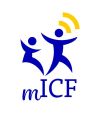Feasibility Study of a Patient-driven Mobile ICF-based Assessment Tool (mICF)
Duration:
Unit at THL:
On other websites:
To develop and test the user experience and feasibility of a patient-centered proof-of-concept (POC) of the mICF.
Objectives
- to develop with agile techniques a proof-of-concept (POC) of the mICF (an ICT approach for person-centred assessment of functioning based on ICF) to record a person's (with severe disabilities) functional status (problems and attributes) in terms of ICF (functioning/disability status and contextual information).
- to test the user experience and acceptance of the first iterations of the POC, first with people with physical disabilities and later with short grown children and adults with severe disability as an example of a chronic condition and their service providers.
- to determine how efficiently the patient-driven functional profiles provided by this mobile based solution could support users and providers in the front line (e.g. clients, patients, parents, caregivers, social and health service providers) in shared decision-making of the patient goal setting and rehabilitation planning.
Implementation
We have designed three interrelated work packages:
WP1: Agile prototyping of the self-assessment tool for everyday rehabilitation process: Content requirements include the whole ICF and ICF-CY, relevant core sets, and a possibility to tell the user’s own story (audio/icons/free text etc), and a patient-report outcome measure. Prototype features are developed in subsequent iterations, based on feedback from WP2. The software solution will link the users’ input to ICF creating a functioning profile.
WP2: Usability evaluation: Users are consulted in an iterative process of subsequent Minimum Viable prototypes (MVps), each to be tested for user experience (usability, acceptance, ease of use, navigation etc.) in their real life, as part of their rehabilitation plan.
WP3: Feasibility evaluation and comparing the functioning profiles with the current assessment methods: The functional profile will be shared with involved carers and health professionals to optimize goal setting for care of the users. Summative and formative data are collected in individual and focus group interviews, from the solution, and in a linked study. Information quality, system quality and service quality are measured separately, and analysed using data triangulation. Evaluation of the solution and its user experience are incorporated in the development project as work package 3.
Partners
- Social Insurance Institution
- JAMK University of Applied Sciences
- Finnish Association of People with Physical Disabilities
- Valteri school and North Karelia Central Hospital
- International mICF Partnership
- WHO Family of International Classification
- Functioning and Disability Reference Group (WHO FIC FDRG).
Funding
- Social Insurance Institution (100 000 €)
- THL 9000 €
- JAMK University of Applied Sciences (JAMK) 7000 €
- Finnish Association of People with Physical Disabilities 2000 €
- Valteri school and North Karelia Central Hospital
Contact information
Heidi Anttila
Senior Researcher
e-mail: [email protected]
See presentation of the user experiences of the first ICanFunction prototype
ICanFunction - User experiences




